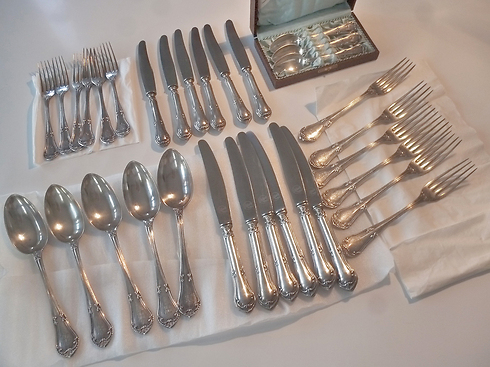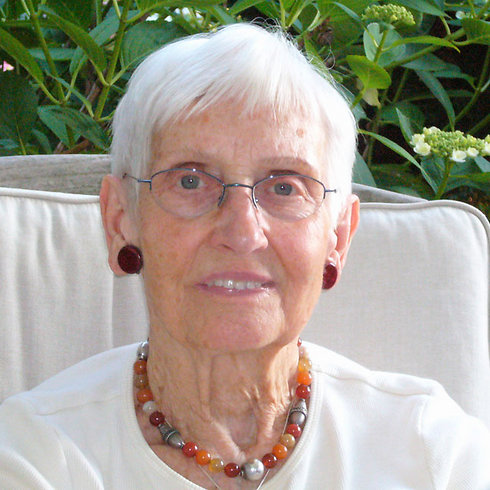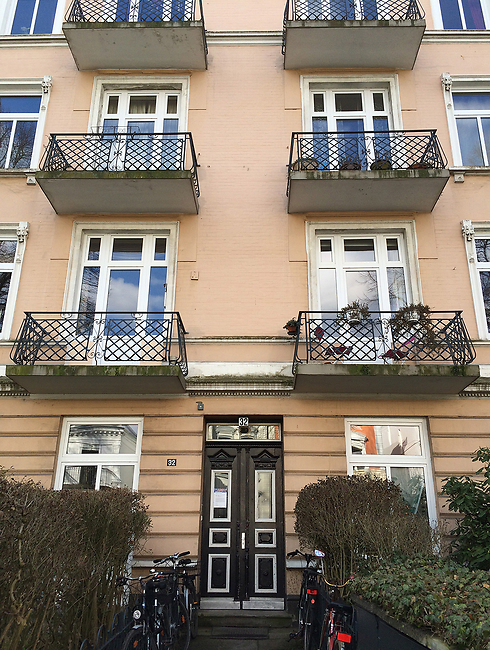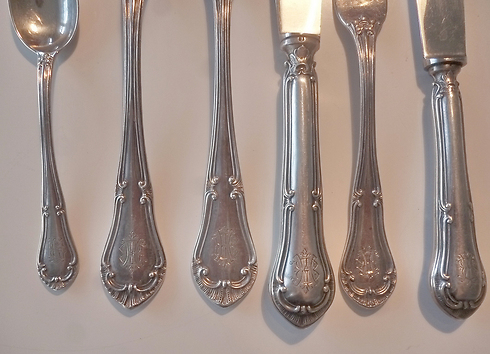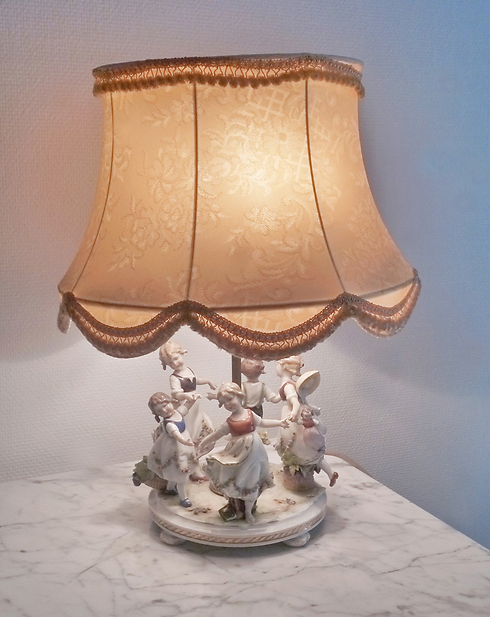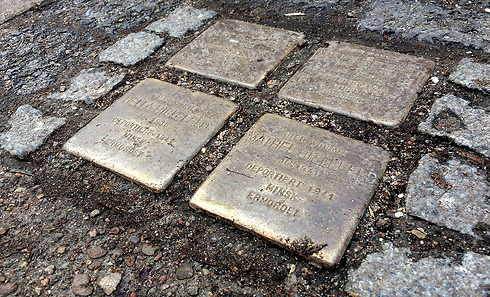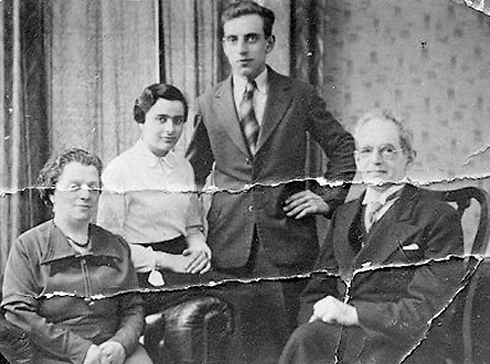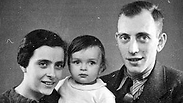
German guardians of Jews' treasure searching for heir
Hamburg family looking to return valuable items left behind by Jewish friends when they were sent to their death in Nazi concentration camp in 1941.
"It doesn't belong to us," explains Theda Olsen, whose grandparents were asked to watch the items by their Jewish friends, the Bielefeld family, just before they were deported to a concentration camp. They believed that they would return to their home one day, but despite the evidence that they were all killed – the Olsen family is still waiting for the day one of their relatives will arrive to claim the inheritance.
"My brother and I don't have any memories from the Bielefeld family because they died before we were born, but for us it was always a story passed on in the family," Theda recalls. "We were very touched by what happened to the Bielefelds, and the uncertainty surrounding their fate always raised an interest among us."
Her mother, Traute, who was a child during the Holocaust, remains the only person who knew the Bielefelds personally. Her parents opened a small fish store near their apartments in Hamburg, and her father befriended Kurt Bielefeld, whose father ran the opposite electronics store.
"Before the Nazis' rise to power, my parents didn't even know that the Bielefelds were Jewish," says Traute. "It didn't even matter. Only when the persecution began, they told my parents about their difficulties."
Traute's parents did not settle for a show of empathy, but insisted on helping their friends, even at the cost of risking their own lives.
"The Jews at the time found it difficult to buy food in regular stores because they wouldn't serve Jews anymore, while my parents had the possibility of helping and giving them something to eat," she recalls.
And so Kurt Bielefeld and his father, Alfred, began visiting the store frequently, and Traute's father would sneak packages of fish into their hands. The Bielefelds would hide the yellow patch on their clothes and try not to raise the other customers' suspicions, while little Traute was warned by her parents not to tell anyone about their Jewish friends.
"My grandfather and grandmother took a risk, because what they did was against the law of course," adds Flemming Olsen, Theda's brother. "But they felt responsible for the Bielefelds, who were their neighbors and friends."
Flemming stresses that "my grandparents were against the Nazi regime, but there was nothing they could do. They were also forced to hide this fact from the customers and the rest of their friends. The only thing they felt they could do was help the Bielefelds by sticking to the friendship with them and feeding them."
He says the Bielefelds tried to protect their German friends as well, urging Flemming's grandfather to join any organization which could help him evade suspicions and hide the fact that he was the enemy of Nazism.
"None of them imagined how much things would still deteriorate," Flemming admits.
'Take care of the items until we return'
The turning point in their understanding of the Nazi regime's dangers was after the assassination of German diplomat Ernst vom Rath, which also led up to Kristallnacht, The Night of Broken Glass riots.
The Gestapo in Hamburg arrested dozens of Jews, including Kurt Bielefeld, and sent them to a concentration camp near Berlin. Kurt later told his friends how they had been forced to stand in a field for two days: "People dropped like mosquitoes," he described it to Traute's parents. "The weak ones collapsed and died."
At the end, for an unknown reason, those who survived were allowed to return to their homes.
"After this incident, the Bielefelds became very alert," Flemming adds. "They realized that the situation in Germany was about to become very difficult for them."
The Bielefelds even mulled the option of leaving Germany. The family of Marion Bielefeld, Kurt's wife, had a shipping company in Hamburg and they considered using one of the ships to flee to Britain, where her distant relatives lived.
"They didn't do it in the end, mainly because they couldn't imagine how serious their persecution was about to become," Flemming explains. "Kurt was a decorated soldier who had fought for German in World War I, and he felt German for all intents and purposes. The entire family felt that way. They didn't want to leave."
But in November 1941, the entire Bielefeld family was required to "evacuate" – Kurt and his wife Marion, his parents Alfred and Helen, and his daughters Hella, 3, and Mathel, six months. Their fate remained unknown, until decades later Traute Olsen found out that they had been sent to a concentration camp in Minsk and shot to death weeks after arriving there.
"Kurt hoped he would be sent to a place where he could work, so he took his work tools with him," says Flemming. "They also exchanges blankets with my grandparents – they gave them light summer blankets and received warm and thick woolen blankets in return, which they took along with them."
Kurt asked his German friends for one more thing: To take care of their most valuable items until the day they return.
"He gave them an 18-piece silver cutlery set and a Meissen porcelain lamp, which is considered very expensive. The letters HB, the symbol of the Bielefeld family, are engraved on the cutlery, so we believe it is a family inheritance," Flemming adds.
"They didn't reveal the story behind these items and they didn't say what should be done with them while they were away. They just asked our grandparents to take care of the items until they returned and took them back – which never happened."
A needle in a haystack
"When my grandmother died," Theda goes on, "the items were transferred to my mother's house and have been here since then, waiting."
Traute took the items out of their hiding place in order to share the story of Bielefelds with them. "Mother told us the whole story when we were children," Flemming recalls, "but decades went by before we came up with the idea to try to locate the Bielefeld family's distant relatives in order to return the items to them."
According to Theda, this hope began to rise in them only in 2009, after her parents were exposed to the "stolpersteine" project – "stumbling blocks" laid at the entrance to houses where Jews lived across Europe. Traute told the project initiators about the Bielefeld family and made sure to have such a commemoration cobblestone placed at the entrance to Kurt's house and at the entrance to his parents' store.
"I am 82 years old, and I still cry often when I think about those days," she says today.
Her daughter adds, "My mother still feels bad about that period, about what happened to the Bielefelds and about the fact that they failed to help their friends. To this very days, it's still something she feels bad about. It's a story which is passed on in our family and which touches us, and we are glad that we are trying to do something else now.
"There may still be a chance, even if it is slim, that we'll meet a relative of the Bielefeld family and give back those items. Then we'll be able to share our memories from them and talk about everything that happened at the time."
So far, the Olsen family tried to enlist the help of Hamburg's Jewish community, but was unsuccessful. They also turned to the Ghetto Fighters' House Museum and to the Yad Vashem Archives, but the only information they received was that the family members had died in Minsk, based on a list of murdered German Jews found in the national German archives.
Now the family is interested in turning to the international tracing service operated by the Red Cross for that purpose.
"There may still be distant relatives of Marion Bielefeld in Britain, for example," Flemming assumes. "We never tried to find them because we didn't know where to start. We feel that it's like looking for a needle in a haystack."
And yet, the Olsens refuse to give up. "The story is deeply rooted in our family. Although my sister and I were born decades after the Bielefelds died, we feel some kind of connection to them."
"There has always been a sense of responsibility in my family," Theda adds. "I, my brother and sister were not born yet at the time, we didn’t take part in all the horrible things the Nazis did and it's not our fault, but because we are Germans we felt somewhat responsible for what happened and this is our small part in the attempt to atone for it."
Theda promises that even if the Bielefelds' property is returned to its rightful owners one day, the family's story will still be passed on from generation to generation in her family.
"My sister has two daughters and my mother has already told them about the Holocaust and about the Bielefelds. My daughter is one year told today, but when she grows up I will tell her about it of course. There's no doubt about it."
Do you have any information which may help the Olsen family's search? Please write to [email protected]










